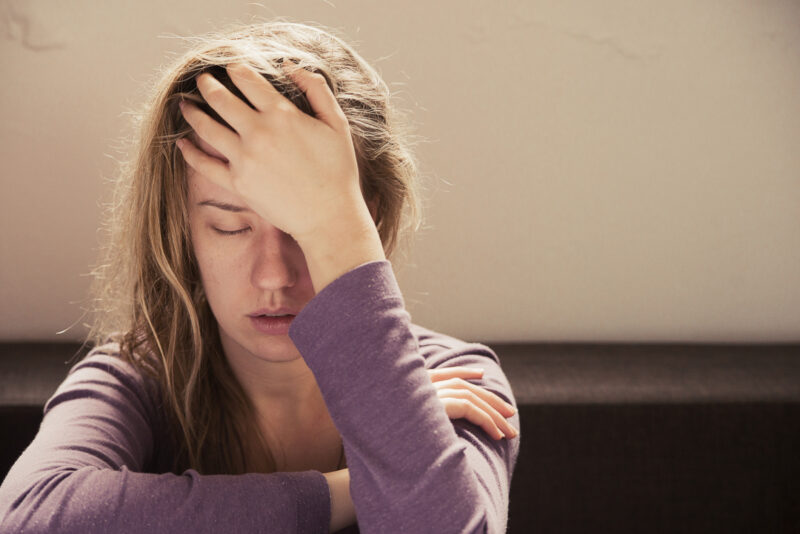
How Do You Stop Anxiety Sweating?
4 min.
Do you notice yourself sweating whenever you’re anxious? Learn what causes anxiety sweating and practical tips for reducing anxiety and excessive sweating.
When a person experiences anxiety, their body releases the stress hormone cortisol, which activates their sweat glands. This is a normal physiological response, but in people with heightened anxiety or specific anxiety disorders, like panic disorder or social anxiety, this response may be exaggerated and cause excessive sweating. For some people, this sweating may also occur during night sweats or hot flashes, especially if anxiety is coupled with hormonal imbalances or other health conditions.
Anxiety sweating can negatively affect the daily lives of many people, but managing excessive sweating is possible with support. Read on to learn effective strategies for managing this symptom of anxiety—plus more information about why anxiety sweating occurs and what triggers it.

We can help you manage anxiety sweating
Virtual, intensive treatment for anxiety.
How to stop anxious sweating
When a person experiences anxiety, their body releases the stress hormone cortisol, which activates their sweat glands. This is a normal physiological response, but in people with heightened anxiety or specific anxiety disorders, like panic disorder or social anxiety, this response may be exaggerated and feel different from regular perspiration. Anxiety sweating could include nervous sweating in anticipation of a stressful event, sweaty hands or excessive underarm sweating during moments of panic or social anxiety or profuse, full-body sweating during a panic attack. Here are some tips for managing anxiety-induced sweating.
1. Relaxation techniques
Relaxation techniques, such as deep breathing exercises, are a powerful tool for reducing anxiety and its physical symptoms, like excessive sweating. By calming their breathing using techniques such as 4-7-8 breathing and box breathing, a person can deactivate the body’s stress response. Regular practice of these exercises can help the body respond more calmly to stress, reducing both anxiety and the sweating that often accompanies it.
2. Lifestyle modifications
Managing anxiety and stress through lifestyle changes can significantly help reduce anxiety sweating. Regular exercise not only reduces overall stress, but also helps regulate the body’s sweat response by increasing the production of endorphins, which improve mood. Getting enough sleep (7-9 hours each night) is also crucial, as sleep deprivation can worsen anxiety symptoms and trigger more frequent or intense sweating episodes. Additionally, limiting caffeine and alcohol intake can be beneficial, as both substances can exacerbate anxiety and contribute to excessive sweating.
By incorporating these habits into their daily life, people can better manage anxiety and its physical effects.
3. Cognitive behavioral therapy (CBT)
In some cases, for long-term management of anxiety sweating, cognitive behavioral therapy (CBT) can be extremely effective. CBT helps people identify and challenge the negative thoughts and behaviors that trigger anxiety, enabling them to develop healthier thought patterns and coping mechanisms. Furthermore, it has been proven to reduce the frequency and intensity of anxiety attacks, including the physical symptoms like sweating. Over time, this can help reduce anxious sweating in response to triggers.
4. Medical treatments
If anxiety sweating persists or becomes debilitating, medical treatments may be necessary. Prescription-strength antiperspirants, which block sweat production in the sweat ducts, can provide relief for areas prone to excessive sweating, like the underarms or palms. Botox injections may also be effective for focal hyperhidrosis, temporarily blocking nerve signals that stimulate sweat production, particularly for underarm sweating and sweaty hands.
Additionally, certain medications, such as antidepressants or benzodiazepines, can help manage the underlying anxiety, which may reduce excessive sweating. However, all treatments should be used under the guidance of a healthcare professional.
When to seek medical help for anxiety sweating
For those who find their anxiety sweat is becoming increasingly difficult to manage, or if it’s interfering with their daily life, it may be time to consult a healthcare professional. A doctor can help determine whether a physical or mental health condition is contributing to these symptoms.
In some cases, hyperhidrosis, a condition where excessive sweat production occurs without a clear medical cause, may be the underlying issue. People with primary hyperhidrosis experience excessive sweating in localized areas, such as the palms, feet, or underarms. In contrast, secondary hyperhidrosis occurs due to an underlying medical condition or medication, and could be triggered by anxiety. In both cases, treatment options like antiperspirants, medications, or therapy may help reduce symptoms.
However, if anxiety sweating is linked to an underlying mental health condition, such as generalized anxiety disorder or panic disorder, it’s important to treat both the physical and psychological aspects of the symptoms to achieve the best results. Either way, early intervention and a comprehensive treatment plan can help reduce the impact of anxiety sweating and improve overall quality of life.
How Charlie Health can help
If you or a loved one are struggling with anxiety, Charlie Health is here to help. Charlie Health’s virtual Intensive Outpatient Program (IOP) provides more than once-weekly mental health treatment for dealing with serious mental health conditions, including anxiety. Our expert clinicians incorporate evidence-based therapies into individual counseling, family therapy, and group sessions. With treatment, managing your mental health is possible. Fill out the form below or give us a call to start healing today.

